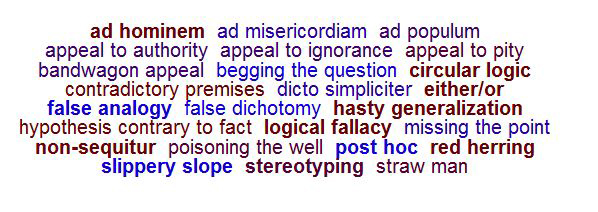Identify Fallacies in Short Examples
Fallacies prevent the meaningful exchange of ideas by distracting the reader with various appeals instead of by using sound reasoning. There are several more fallacies than the eleven you will work with here; many overlap and have more than one name. What is most important is to gain awareness of how to refute arguments that oppose your position and how to avoid fallacious reasoning in your own arguments.
- Ad hominem: A rhetorical fallacy intended to distract from an argument by attacking the character or circumstance of the proponent. This personal attack is intended to devalue the claim without regard for the evidence provided.
- That scientist could not be right about that theory; just look at how she wears her hair!
- Senator Jones was a conscientious objector during the Vietnam War, so his proposal to limit spending on the military has no merit.
- Why should we think a candidate for governor who has cheated on his wife will keep his campaign promises?
- Bandwagon: A persuasive technique, often used in media messages, that appeals to the “everyone is doing it” mentality.
- Since 85% of consumers purchase PCs rather than Macs, PCs must be better computers.
- Why can’t I pierce my tongue? Everyone else is doing it.
- Nobody drives that kind of car any more.
- Circular logic or circular reasoning: A logical fallacy in which an assumption is made in a definition or argument that includes the very point that one is trying to prove.
- The candidate won the election because enough people voted for her.
- George Bush is a good communicator because he speaks effectively.
- Cruel and unusual experimentation on helpless animals is inhumane.
- Either/or: A conclusion that oversimplifies the argument by reducing it to only two sides or choices.
- All drugs must be legalized or banned.
- We can stop using oil products or destroy the earth.
- America: Love It or Leave It.

- False analogy: An inaccurate, inappropriate, or misleading comparison between two things.
- Gene-splicing is really no different than creating a new recipe by combining familiar foods in a novel way.
- Letting prisoners out on early release is like saying they have never committed any crimes.
- If we put humans on the moon, we should be able to find a cure for the common cold.
- Hasty generalization: A conclusion (often the result of bias) drawn from limited or insufficient evidence, whether intentional or not.
- Fifty percent of the women who took the driving test on Tuesday failed. Women must be lousy drivers.
- Even though it’s only the first day, I can tell I won’t like this teacher.
- When attendance is down and the team is losing, the football coach should be fired.
- Non-sequitur: A logical fallacy in which an inference is made that does not follow from its premise.
- If those protesters really loved their country, they wouldn’t question the government.
- Because my brother is wealthy, he will make a good husband.
- Paul Smith has my vote for mayor because he has the best campaign organization.
- Post hoc: A faulty conclusion that assumes that, because one thing followed another, it was caused by the other. The full Latin label for the fallacy is post hoc ergo propter hoc, which means “after this, therefore because of this.”
- Mayor Davis raised taxes and then the rate of violent crime went up. Davis is responsible for the rise in crime.
- She drank three large glasses of water and became ill soon after. Drinking too much water always leads to illness.
- A year after the release of that violent video game, incidents of school violence tripled—surely not a coincidence.
- Red herring: An argument that uses misleading or unrelated evidence to support a conclusion.
- I shouldn’t have to pay a fine for running a red light. Many other people who are thieves and murderers are out there driving, and the police should be after them, not a decent citizen like me.
- The level of mercury in seafood may be unsafe, but what will fishermen do to make a living?
- I know I forgot to deposit the check into the bank yesterday. But nothing I do pleases you.
- Slippery slope: A conclusion based on the premise that one thing will lead to another, oftentimes with disastrous results.
- If I get a B in high school, I won’t get into the college of my choice and will never have a meaningful career.
- If we ban SUVs because they are bad for the environment, eventually the government will ban all cars. So we should not ban SUVs.
- We’ve got to stop the electric rate increase. Before we know it, they’ll charge us $100 per minute!
- Stereotyping: A fallacy in which one classifies a person or group according to a common aspect that is oversimplified, rigidly applied, and often uncomplimentary.
- All librarians are shy and wear horned-rimmed glasses.
- People who live in cities are unfriendly.
- All blondes are dumb.
In the exercises below, match the examples with the correct fallacies. Keep in mind that some of the fallacies are very similar to each other. You can always look back to the definitions and examples to help you decide.